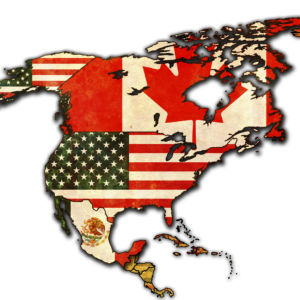The George W. Bush Institute recently convened a major effort to analyze the economic relationship that links the United States with our neighbors. We did so because we believe North America is the cornerstone of a national security strategy for the 21st century.
We started by assembling a database of measures of competitiveness, openness and freedom. The result contains numerous surprises, particularly for those who believe the United States is being left behind in global competition.
The first surprise is that, on our own, the United States out-competes over 91 percent of the 101 countries measured. Our economy’s ability to mobilize investment to support job creation and innovation surpasses that of all but a handful of countries. What’s more, North America as a group still out-competes 75 percent of the countries measured.
The second is perhaps less surprising: the trend for the United States and for North America as a group is down. This is mostly due to sustained deficit spending and accumulating public debt, and partly due to an increase in business regulation. We see the result in declining rates of new business formation and the frustratingly slow pace of recent productivity increases.
North America as a group has also lost ground for the same reasons. And it has slipped in spite of Mexico’s successful macroeconomic policies during this period, which stabilized its budget and debt and partly counterbalanced the U.S. failure to do likewise.
The question we then asked ourselves is, what would it take to improve the ability of the United States to compete globally?
Obviously, we all need to get our fiscal houses in order and reverse the relative growth of our public debt. By the same token, the business and trade environments of all three countries have declined, particularly in the United States.
On trade, we are being left behind as other countries and regions open their markets, and seek to compete with us on the global marketplace. Prompt action on the Trans-Pacific Partnership trade deal is imperative, and the United States should bring Canada and Mexico into the Trans-Atlantic Trade and Investment Partnership to put ourselves back at the center of world trade where we belong.
Rapid technological changes in energy extraction, production and distribution, combined with a remarkable reform in Mexico, have produced an extraordinary opportunity for the North American partners to emerge as global energy leaders across the board — despite oil price fluctuations.
Yet we also have a slow-motion crisis in border infrastructure across North America. Delays at our land borders are undermining security and adding billions to the cost of production.
Finally, each nation faces a human capital challenge. We need to ensure that our young people have the skills and knowledge to succeed in the 21st century. For all of our efforts to reform education, attainment rates are too low, the skills gap continues to grow, and collaboration between business and education remains insufficient.
This represents a daunting economic agenda. One might wonder if it is worth the effort. And would it have greater effect than efforts we might undertake solely within the United States?
The answer is our national security. Put simply, for all of its challenges, North America is a pretty good neighborhood. Who among our allies would not rather have Mexico and Canada as neighbors than China, North Korea, Russia, Syria or Libya?
Our perimeter is already quite secure. This is certainly true to the north, where NORAD secures the airspace of the United States and Canada. The U.S.-Canada joint military operation coordinates patrols over our territory and provides early warnings of any incoming air or maritime threats.
Think for a moment about how fortunate we are to have a neighbor that helps secure our northern border, moving our defense perimeter almost 3,000 miles away from our actual border.
True, the U.S.-Mexico security relationship is not this advanced. Drug cartels are a powerful challenge to law and order in Mexico, and they expend enormous effort to penetrate the U.S. border.
Still, it would be a mistake to fall into the trap of viewing our southern border as a threat to our national security. Unlike some of our allies’ neighbors, our southern neighbor is not a heavily armed power with an aggressively growing military and a doctrine of national security that sees us as its principal threat. Relations between the U.S. and Mexican militaries actually are closer than they have been in a century, and the two coordinate closely and successfully on counter-narcotics operations — just ask Joaquin “El Chapo” Guzman.
The immediate cartel threat is real, but a successful policy could ultimately lead to a security relationship with Mexico more like what we have with Canada, moving our southern security perimeter almost 2,000 miles from our actual border.
In short, a renewed commitment to North America will provide enhanced prosperity and security for the United States. More effective public-private collaboration on energy, border infrastructure, and education and training will produce more rapid growth and sustained job creation. A patient long game on national security, driven by a holistic vision of North America’s perimeters, will create an extended zone of stability. We’ll be so prosperous and so secure we’ll get bored.

